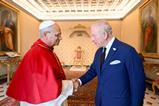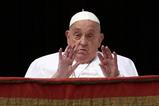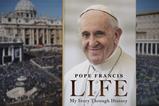Catherine Pepinster shares the inspirational stories of Christians who were willing to face death because of their faith
PERPETUA (AD 182–203)
Separated from her son; killed for sport
We know about the brutality and colonialism of ancient Rome from the New Testament. It was also a culture that admired athleticism, and held competitive games within large arenas. Some of those games took an ugly turn; indeed, when we think of martyrs, we might recall tales of courageous Christians facing lions and other beasts in arenas such as Rome’s Colosseum.
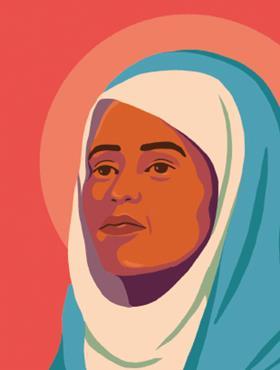
Perpetua was one such Christian. She was a 22-year-old who was put to death along with a pregnant slave, Felicity, in Carthage in AD 203. We know Perpetua’s story because it was recorded in her journal, The Passion of Saints Perpetua and Felicity, which was later completed by another hand after she was executed.
Perpetua was arrested after refusing to reject the new Christian religion. She knew that not renouncing it meant death. While awaiting her fate, she wrote about her dreams – seeing herself as a wrestler in the arena: “My clothes were stripped off and suddenly I was a man. My seconds began to rub me down with oil.” Later she saw herself as a woman at the games of Pythian Apollo, held in Carthage. During those, gilded bronze apples were given to the victorious athletes. In Perpetua’s dream, rather than a pagan master of ceremonies handing out the prizes, Christ was holding golden apples.
It was at one of these games that Perpetua eventually lost her life…where she was part of the entertainment. Perpetua endured attacks by a leopard, a heifer and a boar, before eventually dying by a sword.
PERPETUA ENDURED ATTACKS BY A LEOPARD, A HEIFER AND A BOAR, BEFORE EVENTUALLY DYING BY A SWORD
What really stands out about Perpetua is the way she stood firm against those who tried to turn her away from Christ. They used every possible means of doing so – even her motherhood. Her diary vividly recounts her distress as she endured prison. She was kept in a dark, hot, suffocating jail. She desperately missed her baby boy; it was only when her mother and brother visited that Perpetua was able to see and feed him. Her father, who had always been opposed to her Christian conversion, begged her to give up her beliefs for his sake, saying: “have pity on my gray head”.
For all her traumas and all the attempts to manipulate her, Perpetua would not be moved. It was a terrible choice to have to make, but she put her faith above her family. Rather than a story of a distant time, Perpetua’s narrative transcends history, speaking to us today of how a mother’s natural instincts were severely put to the test.
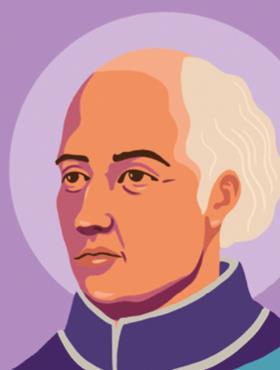
THOMAS BECKET (1120–1170)
He gained the world but was prepared to lose it all
Becket is one of Britain’s most famous saints; the site of his death at Canterbury Cathedral has been attracting pilgrims ever since he was killed more than 850 years ago. And it’s no wonder that Becket’s tale continues to draw people, for it has all the ingredients of first-class drama: a friendship gone wrong, a man who underwent a remarkable and unexpected transformation, grief and repentance, and a clash between belief and politics.
Before Becket was appointed Archbishop of Canterbury in 1162, he had been one of King Henry II’s closest confidantes. His previous role was that of chancellor, raising revenue for the king from sometimes reluctant sources such as the Church. But once he was ordained – which was necessary to take on the role of archbishop – he sided instead with the Church. He was no longer willing to do the king’s bidding. Frustrated he was no longer able to rely upon his close friend, Henry lashed out, demanding that Becket be dealt with. These are the words he is said to have uttered: “Will no one rid me of this turbulent priest?” Four knights took the king at his word.
The knights arrived in Canterbury late in the evening of 29 December and found Becket with his advisers. After a heated row he left to attend the evening service of vespers in the cathedral – but he was not to survive it. The knights set about him with swords and axes. They sliced through the crown of his head, and one of them removed it completely. Some of his brains were smeared over the floor.
Becket’s story still resonates today because we see a man who gained the world – riches, honours, the friendship of a king, the status of an archbishop – but was prepared to lose it all. None of it mattered to him as much his faith mattered. Like so many, he had thought he was a Christian…and then his eyes were opened. It was his ordination that drew him up short: his calling really began when he had to choose between God and earthly things.
His story is also still so relevant because it reveals the need to confront the brutal arrogance of power. King Henry assumed he could keep Becket right where he wanted him – but God had other ideas.
Generations have been drawn to Becket’s conversion and courage, but he also had a lasting impact on the man who caused him to lose his life: Henry II. It could be argued that it suited the king to later make a public act of penance at Canterbury for political reasons, given that Christian Europe had been stunned by Becket’s murder. But it is hard to believe that even that wily king would not have been grief-stricken by the barbaric killing of his old friend. So, Becket’s story also highlights the importance of repentance and conversion – whether you are a saint or a sinner.
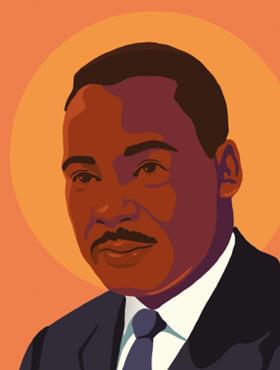
MARTIN LUTHER KING JR (1929–1968)
Let freedom ring
Last year, the continuing presence of racism in society was highlighted by the death of George Floyd. Protests afterwards focused not only on his unlawful killing, but on the continuing inequalities of society and how black people endure a lack of justice.
That these inequalities continue more than 50 years after the death of Martin Luther King Jr is a shocking indictment of society. It also illuminates how much we need King’s wisdom today.
King’s desire for justice and human dignity for all human beings, regardless of the colour of their skin, was inspired by the religious tradition from which he emerged in the American south. He always framed the struggle for racial equality as part of his religious vision. On the eve of his assassination in Memphis on 4 April 1968, he said: “I just want to do God’s will. And he’s allowed me to go up to the mountain. And I’ve looked over. And I’ve seen the promised land.”
King’s training as a pastor had introduced him to the theology of Reinhold Niebuhr, whose application of ethics and theology to politics introduced him to the social gospel. They were ideas he explored as part of his work as pastor in Montgomery, Alabama. By 1955, African Americans in the city were taking a stand against racial segregation and King emerged as one of the major leaders of the Civil Rights Movement. It was a movement that benefited hugely from the ready network of activism, the oratory and the moral authority of the African American churches, in which King was so involved.
The campaign did not stop in Alabama. King and other leaders took it all the way to Washington DC, where, in August 1963, a crowd of 250,000 heard King speak for 17 minutes of his dream:
“I have a dream that one day this nation will rise up and live out the true meaning of its creed: ‘We hold these truths to be self-evident: that all men are created equal’…
“And when this happens and when we allow freedom to ring, when we let it ring from every village and every hamlet, from every state and every city, we will be able to speed up that day when all of God’s children, black men and white men, Jews and Gentiles, Protestants and Catholics, will be able to join hands and sing in the words of the old Negro spiritual: ‘Free at last! Free at last! Thank God Almighty, we are free at last!’”
King saw direct parallels between biblical accounts of struggles and the story of the black American people, particularly with the Jewish people coming out of Egypt. But he wanted no equivalent of the smiting of the Egyptians: his was a creed of non-violence. His violent death, by shooting, was therefore all the more shocking.
In 2013, when Barack Obama was elected president of the United States, many might have thought that King’s dream had at last been realised. But the events of 2020 show that we have yet to reach the promised land. King’s example inspires us to keep our eyes always on the horizon, and not waiver from seeking the justice the Gospels point us to.
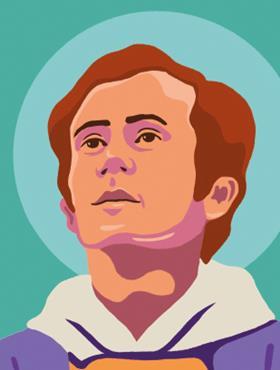
JERZY POPIEŁUSZKO (1947–1984)
A voice against oppression
Polish priest Fr Jerzy Popiełuszko was just 37 when his bound and gagged body was found in Poland’s Vistula River. He died at a time of great turmoil in Poland, when the trade union Solidarity was taking on the communist regime, protesting the oppression and lack of freedom.
Popiełuszko had been ordained a Roman Catholic priest at the age of 25 and, after work in parishes and hospitals, he became a chaplain to striking steelworkers. He distributed food to the hungry, sat with families in court as strikers were put on trial and spoke up during his sermons against intimidation and martial law. His services were described as the heartbeat of national resistance. There were no holds barred in his denunciation of what was happening in Poland. He described “a nation terrorised by military forces”, “people detained and brought to trial, their only guilt being their determination to remain faithful to the ideals of Solidarity” and “attempts to send healthy internees to mental institutions”.
Between January and June 1984, Popiełuszko was interrogated 13 times. Charges, later dropped, were brought against him alleging he stored illegal publications, ammunition and explosives. After preaching a sermon criticising the Russians for interfering in Polish affairs, the Moscow paper Izvestiya denounced him for collaborating with counter revolutionaries. After another huge rally with thousands of Poles, Popiełuszko was found dead, his body dumped in the river. There was a global outcry at his death and 400,000 people rallied to attend his funeral, again throwing a spotlight on the communist regime.
Although Popiełuszko’s killers were brought to trial, it has never been proven whether they acted alone or were ordered to commit murder by Polish authorities. Documents about the death remain unpublished.
Like Thomas Becket and Archbishop Óscar Romero of El Salvador, who was assassinated inside a church, just moments after he delivered a sermon where he spoke against the government’s human rights violations, Popiełuszko died after challenging the authorities. Each of these men would say their faith caused them to stand up for the truth. Popiełuszko loved Christ, and he knew what was right. His was a life of integrity.
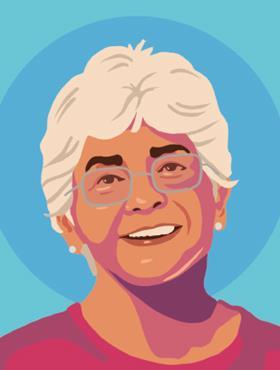
DOROTHY STANG (1931–2005)
The ‘martyr of the Amazon’
Sister Dorothy Stang was an American nun. After joining a Roman Catholic order of sisters, and spending time teaching, she moved to work in Brazil in 1966 at the age of 35. She dedicated the rest of her life to working with the rural poor, helping them make a living by farming and forestry. She also campaigned to combat deforestation in the Amazon rainforest.
The Amazon comprises 40 per cent of all the tropical rainforests in the world. It hosts half of the world’s plant species and is home to 20 million people. Sister Dorothy’s frustration grew as she witnessed the destruction of this natural resource, which is so vital to the planet’s future. She saw the forest and local people being plundered for financial gain by illegal logging operations, land speculators and cattle ranchers and witnessed political leaders allowing the destruction to continue. She spoke out against these abusers – and paid with her life.
AS THE GUNMEN APPROACHED SISTER DOROTHY, SHE TOOK HER BIBLE FROM HER BAG AND BEGAN TO READ THE BEATITUDES
On 12 February 2005, as she walked along a dirt road in Para to a meeting to talk about rights in the Amazon, two hired gunmen fired six shots and killed Sister Dorothy. As the gunmen approached Sister Dorothy, she took her Bible from her bag and began to read the Beatitudes:
“God blesses those who hunger and thirst for justice.” Prosecutions for her killing have been complicated but connections to her criticism of illegal land deals have been proven.
Sister Dorothy has long been called ‘Martyr of the Amazon’, a woman whose faith gave her the courage to take on vested interests and champion the poorest













